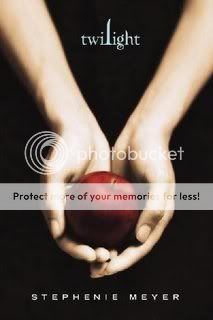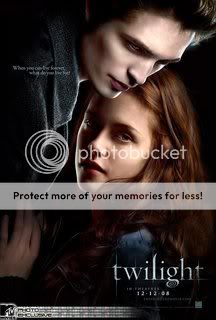Disclaimer: I don’t think I really need to summarise this one, since it is so widely known. But in case you haven’t read it, be warned that the following discussion is full of SPOILERS and should not be read by persons who wish to be surprised by the book. I don’t want to call this a review, but there are some review elements in there nonetheless.
When a book gets as hyped up as Twilight I tend to recoil from it rather than jump on the bandwagon and read it right away. This is not because I don’t like hype, but because I hate buying books at full price and then discovering I don’t like them. I’d much rather wait until I can read a book and then decide if I want to own a copy, which I can, by that time, probably get second hand. Foreign bestsellers don’t arrive immediately in the libraries here, and I don’t know a lot of people who read foreign books, so unless I buy them, I can’t read them right away.
I had decided, as much as a couple of years ago, that I wanted to read Twilight, mostly because of the hysterical reactions to it. So many young readers, especially girls, thought it was the best thing ever, and then the inevitable backlash came: it was anti-feminist, Edward was a creepy stalker and Bella a perpetual victim, it was badly written, it was trash, etc. etc. Flame wars erupted on reading forums and anti-twilighters told stories about being menaced or even attacked by rabid Twilight fangirls, who vehemently denied the accusations. I watched all of this from a safe distance and thoroughly enjoyed the show without getting involved.
What really captured my attention and aroused my interest was the statement I heard from more than one adult reader saying – in different ways – that it was trash, but the kind of trash that sucks you in and keeps you reading until you finish it, and then you get a reading hangover, recover from it and immediately want more, sort of like junk food or candy. Now that I have finally read it, I tend to (guardedly) agree with this. This is quality trash, eminently readable much in the same way as Charlaine Harris’ Sookie Stackhouse books, the books of Sidney Sheldon or those of Jackie Collins.
These are books you don’t read for the prose – you read them for the story, and Stephenie Meyer, using Bella Swan’s voice, is one hell of a good storyteller. The writing may be somewhat clunky and over-descriptive at times, and some of the themes may indeed be anti-feminist and some of this stuff is just over the top (sparkly vampires, anyone?), but the story is a classic one about a love so breathtaking and (to the lovers) perfect that it can only be experienced once in a lifetime. Of course it adds complications and tragic overtones that the male half of the loving couple is a nearly immortal vampire and the female is mortal, but what drives the story is exactly the conflict this causes: the what-ifs and the hows and whys. Then Meyer adds a thriller element and off we go on a whirling ride, full of teenage angst and hormones, which Meyer captures perfectly.
For the people who think these books are giving girls a bad example of what a romantic relationship should be like I have this to say: trust the girls and young women who exclaim on Edward’s hotness and the perfection of his relationship with Bella to know the difference between fiction and reality and what they can and can not have. After all, most people who read serial killer stories at that age have the good sense to not become serial killers, so why should you think girls are going to strive for the kind of relationship Bella and Edward have and be disappointed just because they end up in relationships that don’t echo that relationship?
I have to add that while Bella is a believable character (I can find aspects of her in most of my friends and myself), Edward is just too much of a Gary Stu to be likable. There seems to be no end to his physical perfection and he seems to be able to do anything better that anyone (except I bet he can’t cook). He is even ready to sacrifice the relationship to keep her safe, even if she is the most delectable thing he has ever smelled. In short, he is the kind of boyfriend teenage girls and even grown women like to fantasise about, because we know damn well they don’t exist in reality. This gets annoying after a while, but then I remember that this is not necessarily how Meyer has envisaged him, but how her narrator, Bella, who is head-over-heels in love with him, sees him, and I begin to wonder if Bella isn’t an unreliable narrator? I guess I’ll have to read the other books to find out.
Readers, if you have thoughts or comments you would like to share with me, please post them below.
P.S. The movie is okay, follows the story quite faithfully except for a few details.Both Bella and Edward seem to be pouting most of the time, and on top of that he is just very, very creepy.
P.S. The movie is okay, follows the story quite faithfully except for a few details.Both Bella and Edward seem to be pouting most of the time, and on top of that he is just very, very creepy.


Comments